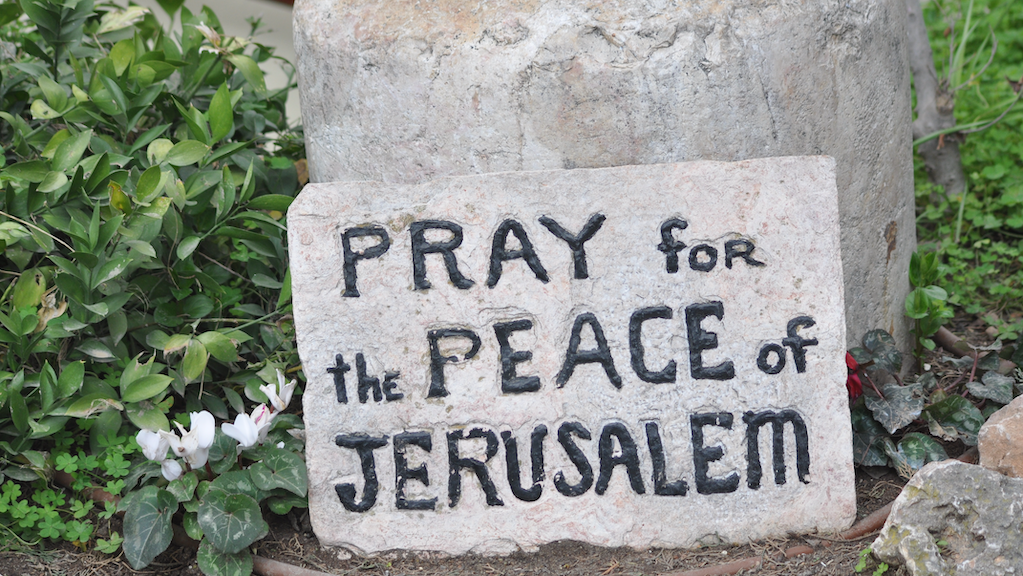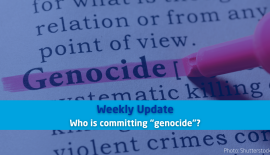“Peace upon Israel”
Why is it always Israel that jumps up in one’s mind, when there is talk about a lack of peace? True, the world in which we live sinks into chaos. Experts are already talking about the Third World War raging around us. But Israel is an island of prosperity, security and peace. It is certainly far better prepared for the future than most highly developed countries. Any European or American city is more dangerous than Jerusalem, Tel Aviv or Haifa.
The CIA’s World Factbook ranks Israel with an average life expectancy of 82.5 years number 12 on a list of all states – far ahead of Liechtenstein (ranking 19th with 81.9 years), Austria (23rdwith 81.6 years) or Germany (34th with 80.8 years). Only in Switzerland (with 82.6 years in rank number ten) people live longer in German-speaking Europe, according to the CIA.[1] A long life is possible only where human lives enjoy protection, where peace and prosperity prevail.
Nowhere else in the world exists a comparably large variety of mentalities, religions, and political beliefs with comparable freedom for all as peacefully side by side as today in the State of Israel. In a global comparison, the modern State of Israel may serve as a model of successful coexistence. This is not to reduce the challenges that Israel faces in dealing with ethnic and religious minorities, handling social or political differences. These challenges indeed exist and there is much to be improved. But the same challenges exist in different hues and with varied weightings in all parts of the world.
Actually, the present state of affairs of the Jewish people and their state very much correspond to what the prophet Zechariah describes in chapter 12 of his book: Jerusalem is a suicidal cup of poison for the nations around, a burdensome stone for all peoples. At the same time it is obvious, that the living God keeps His eyes open on Judah. He protects the inhabitants of Jerusalem. While the area all around Israel rages and sinks into bloody chaos, the much disputed capital of Israel remains peacefully in its place.
As a matter of fact, the Jewish people are hated like no other people on earth. The hatred of Israel is unique. Since the descendants of Abraham, Isaac, and Jacob were a notable assembly of human beings with their own culture and language, there were people who aspired to destroy them. Sometimes regional powers like Egypt or Persia had these intentions. Often it was small groups or tribes that conspired: “Come, let us destroy them so that they are no longer a nation. The name of Israel shall not be remembered anymore!” (Psalms 83:5). In the 1940s, the Jewish people experienced the deepest abyss of existential threat in its history. In the meantime, the tide has turned totally. Today anyone who seriously to threatens the Jewish state existentially threatens the very existence of our entire planet.
The worldwide attention experienced by the Middle East conflict between Israel and its Arab neighbors cannot be explained rationally. Could it be that the nations of the world feel something that has already moved the author of the 122nd psalm? After all, today it is only Christian churches that do not understand that Israel ought to be an issue – the United Nations, the Islamic world, the government of the Federal Republic of Germany, the global media have intuitively long since understood that Israel is the topic. “Peace over Israel” is critical to the fate of the whole world.
“Sha’alu shlom Yerushalayim” (שַׁ֭אֲלוּ שְׁלֹ֣ום יְרוּשָׁלִָ֑ם) Psalm 122 requests in verse 6. A look at different Bible translations shows that these three words cover a whole range of meanin that can not be reproduced in a comparable density in the English language.
When you greet each other today in modern Israel, one asks the other: “What about your peace? How are you?” This is the first aspect that Psalm 122:6 demands: “Ask how Jerusalem is doing! Do not be indifferent! Be interested in what is happening in and around Israel!” This request, actually, is an encouragement to us as journalists. If we do our job properly, just reporting on what is going on in the Middle East, we allow you, dear readers, to fulfill a biblical commandment: “Inform yourselves about Israel!”
A second aspect of the quest in Psalms 122:6 is: “Seek the peace of Jerusalem. Wish Jerusalem good luck!” Sometimes Bible readers, especially those, who are prophetically versed, convey the impression that they are particularly interested in the fight for Jerusalem. “Only suffering and oppressed Jews are good Jews”, some people in the Jewish state quietly express their frustration. If you are reporting that the Jewish people is doing well, immediately you will be confronted with a “yes, but…” Anyone insisting on this description of reality as a journalist jeopardizes his own professional future. And who would donate to Jews who are doing well anyway to make them feel better?! – “Wish Jerusalem good luck! Seek the very best for Israel!”, the psalmist demands.
And finally, “Sha’alu shlom Yerushalayim” (שַׁ֭אֲלוּ שְׁלֹ֣ום יְרוּשָׁלִָ֑ם) transfers the message: “Pray for the peace of Jerusalem! Bargain for the well-being of this city!” – especially, if her misfortune and punishment seem to have been decided by God. A prophet according to the heart of God not only knows what God wants. He is always also a priest and intercessor. A prophet who is also a child of God dares to contradict his Father in Heaven – being fully aware, of course, that God is always right.
Thus, Abraham negotiates with God for the evil cities of Sodom and Gomorrah (Genesis 18:16‑33). Three times, God forbids the Prophet Jeremiah to intercede for Israel (Jeremiah 7:16, 11:14, 14:11). But Jeremiah does not give up. Daniel acts as a proxy for his nation after he had calculated that the 70 years of exile predicted by Jeremiah had expired (Daniel 9). This line continues down to Paul, who may be found on his knees before the Heavenly Father at the beginning of the prophetic chapters 9-11 in his letter to Romans, pleading “to be cursed and cut off from Messiah” for his “relatives according to the flesh, who are Israelites” (Romans 9:3).
Prophets like Jonah waiting under his vine for his predictions to come true (Jonah 4), or King Hezekiah, who submits to the will of God, as long as it is guaranteed, “there will be peace and security as long as I live” (Isaiah 39:8), are unlikely to serve as role models for which God may be enthusiastic. Blind fatalism is alien to biblical thinking. The God of Israel, having predicted judgment, obviously seeks the dedicated resistance of the intercessors.
“Shalom”, the biblical word for “peace,” has little to do with the German word “Frieden” or the English “peace”. We humans often make peace by dividing, by ripping apart what is being desired by many, and, thus, became the object of contention. This was the case in the time of the wise King Solomon (compare 1 Kings 3:23‑25). That may also be the reason why today the two-state solution is so popular, considering no alternatives.
“You are pursuing ‘peace’ and therefore promote a ‘piece-process’,” one rabbi told me in the mid 1990ies, in the midst of the Oslo process, when Jerusalem suffered a bloody series of suicide bombings. “For the sake of peace you make pieces of everything: The Land, the people, our hope! – We are longing for ‘Shalom’. That is something completely different!” “Shalom” is derived from the Hebrew word “Shalem” (= complete, whole) and has something to do with “completeness”, “perfection”, “integrity”. Therefore, our sentence from Psalms 122:6 may also be rendered, “Seek the integrity, the undividedness of Jerusalem!”
The prayer of psalm 122 knew, what today the world of nations seems to merely sense: The integrity of Jerusalem is the key to the well-being of the world. That’s why he says: “For the sake of my brothers and friends, I want to speak of Shalom in you” (verse 8).
He knew that Israel is the heart beat of the living God. He was aware that the separation of the people of Israel from the land of Israel humiliates, dishonors, and desecrates the name of the Lord (Ezekiel 36:20). Jerusalem is the place where the Heavenly Father feels at home, where He wishes His holy name to dwell, where He wants to fellowship with those who love Him. Therefore he concludes: “For the sake of the house of the Lord our God, I request the good for you” (verse 9).
Published on gerloff.co.il October 5, 2018
Footnotes:
[1] The World Factbook, Country Comparison: Life Expectancy At Birth: https://www.cia.gov/library/publications/the-world-factbook/rankorder/2102rank.html(05.10.2018).




